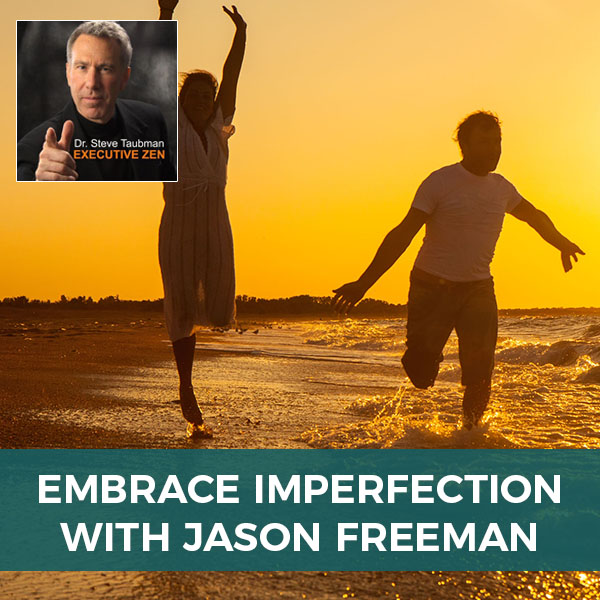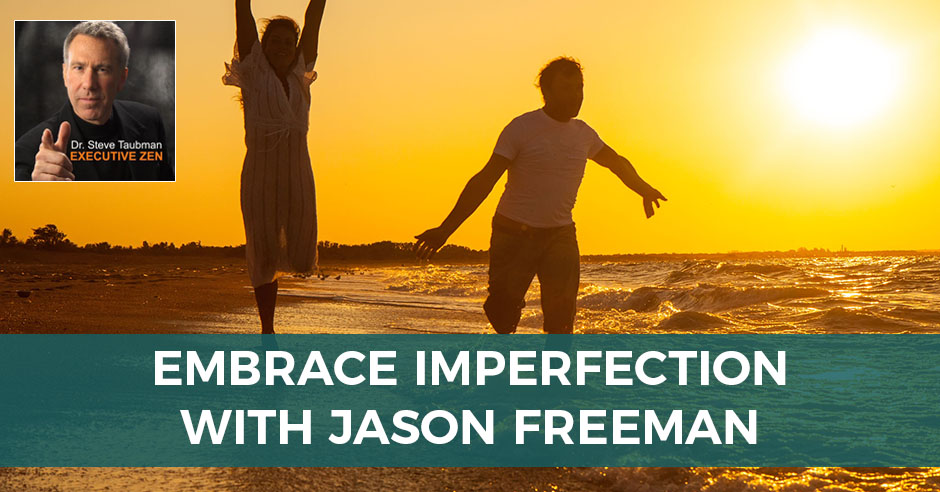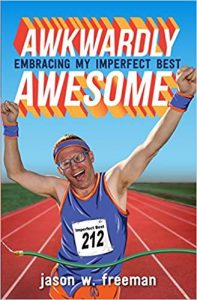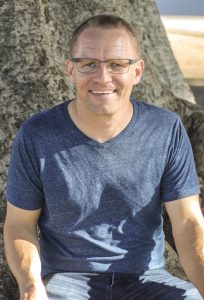

Jason Freeman is a professional speaker, author, and bravery coach who travels the country sharing his inspirational and transformative journey with captivated audiences, and he does it with a pronounced speech impediment. From the dream affirming standing ovation following his TEDx talk in Sugarland, TX to his earliest moments in front of an attentive crowd, Jason has known to trust his seemingly contradictory calling to speak in front of live audiences. He has shared the stage with well-known speakers in the transformational, entertainment, entrepreneurship, and business worlds and has charmed audiences at California Teacher’s Summit, Kyle Cease’s Evolving Out Loud, The Habitude Warrior Conference, The People First Conference in San Diego, and San Diego State University, amongst others. Jason’s message is heartfelt and uplifting, and it will change you! 🙂
—
Listen to the podcast here:
Embrace Imperfection with Jason Freeman
We’re going to be talking about embracing imperfection. Our guest is an expert in that area if such a thing exists. He is an absolute treasure, a delightful person and a great friend. Embracing imperfection is a topic that maybe I’ve tended to shy away from my own imperfection and from my own checkered psychological past. Although it tends to seep out in what I do because we all are who we are. If you bring to the table any degree of insecurity, any rejection of yourself or anything about you that you don’t like, in all likelihood, you’re letting people know how you feel about that thing about yourself. This has every bit as much application in our business lives as it does in our personal lives. How well are we embracing our imperfections, the things about ourselves that we’re uncomfortable with? How effectively are we able to own the fullness of who we are? Whether it’s the things that we’re good at or the things we’re not very good at, or the things we like about ourselves or the things we don’t like about ourselves. That’s where we’re going with this episode.
I’ll start with my own personal self-disclosure. I grew up in a dysfunctional family, if you all know what that means. A lot of trauma, a lot of fighting, a lot of stress, a lot of insecurity. My parents didn’t like each other and from my perspective, for good reason on both sides. They were tough in every possible way for me. My dad, in those days, was a very harsh kind of guy and my mom was very needy and insecure. I never knew how to be, and I was constantly unclear on the rules of engagement. Thankfully, I had a pretty smart head but other than that I felt a lot of pain. I’d go out of the house and I didn’t feel like I fit in. I was bullied, I was marginalized, and I didn’t like the way I felt. I would probably say for a long time I didn’t like me.
It’s interesting because I’ve been reflecting on all of these things lately. Hopefully, I’m getting a TED Talk together in the near future. My TED Talk will be about how to make you better at everything and it’s about our relationship with our dogs. When I talk about my days of abject pain and self-rejection, I had three respites in my life back then. One of them was my Grandma Flo. She was the one person in my life from whom I experienced unconditional love and delight. It was like she got me. She got my sense of humor. She sparkled when she saw me, and I sparkled when I saw her. My second respite was my appreciation of nature, I always had that. Thankfully, I was able to go outside and see the beauty around me and just lose myself in nature and get away from the social world where I didn’t feel like I fit in. The third respite for me was my dog who made me feel great. His hugs and kisses not just masked but soothed a lot of my pain.
We all have a higher place and we all have great gifts to offer. Click To TweetAs I grew up, once I left home and there were many years where I didn’t have a dog and I still had to rely on whatever respites I had to feel good about myself as I made my way into the world. I got pretty successful in a lot of outward ways, but I still had a lot of inner angst. I could look at a whole list of things about myself that I didn’t like and that I didn’t want other people to know about me. I would go in nature and that would help, and I would think about Grandma Flo and that would help, but I missed having a dog.
Finally, I got Woody and a lot of you know what an important part of my life Woody is. He’s a labradoodle and he has made my life better. I’ve learned how to bring my mindfulness practice, my awareness practice to my dog. I’ve got a higher level of connection to him. There’s a bond, there’s love, there’s attention and a lot of that. The mindfulness practices that I’ve strengthened as a result of having him have been the tools, the ladder on which I’ve climbed in order to reach the top of a wall where I was no longer drowning in my own insecurity.
My imperfections, which were social in nature and God knows all the different things I didn’t like about myself, were transcended by mindfulness practice and by having this wonderful dog. Here I am, and I wish I could tell you that I don’t struggle, that I never feel bad about myself and I never experienced imperfection or feel insecure around others, but it’s not true. I continue to struggle, and I view the struggle as being something we all do, as to how do we rise above the inner neuroses? How do we see ourselves from a higher place? We all have a higher place and we all have great gifts to offer. What can we do to emphasize those gifts and to not identify ourselves in that negative state? For me, a lot of that is mindfulness practice and it’s being with Woody. It’s also being around people who see me in ways that I sometimes don’t see myself.

Embrace Imperfection: Sometimes, life can also be about being around people who see you in ways that you sometimes don’t see yourself.
A lot of times for me, the only thing that gets me out of my funk is to have a conversation with somebody who has a higher view of me, a new vision or maybe an old vision that I’ve let go and it needs to be new again. In my life, I’ve watched for people who are able to look beyond the things that aren’t good about me, to see me in that more elevated way and to help me to accept myself. It just so happens that the person that I’ll be introducing to you is one of those people. He too is somebody who has struggled with his experience of imperfection and his feelings of self-rejection. He has reached the place where he knows how to take the high road and how to see things differently in himself and then in others. As a result, he has done so much good in the world to help others put aside the things that they think aren’t good about themselves. In business, to put aside the things that they think stop them so that they can go forward and be unstoppable because they’re not stuck in the mud with their own negativity.
Everything I said is applicable to your personal and your professional life. I’ll be speaking with a respected expert and speaker and hopefully, he’ll set me straight on everything I said in case I was completely non-sensical. We’ll come away with ideas not only to improve your business but also to improve your capacity for self-love and for being a contributing member of society without being stuck behind your own shame, insecurity, anger or whatever it is.
—
I am thrilled to be introducing my guest. Jason Freeman is a professional speaker, author and bravery coach who travels the country, sharing his inspirational transformative journey with captivated audience and he does it with a pronounced speech impediment. From the dream affirming standing ovation following his TEDx Talk in Sugarland, Texas to his earliest moments in front of an attentive crowd, Jason has known to trust his seemingly contradictory calling to speak in front of live audiences. He’s shared the stage with well-known speakers in the transformational, entertainment, entrepreneurship, and business worlds and has charmed audiences at the California Teacher’s Summit, at Kyle Cease’s Evolving Out Loud event, at the Habitude Warrior Conference, The People First Conference in San Diego, and San Diego State University, among others.
Graduating from college with majors in English and Social Work, Jason went on to obtain a Master of Fine Arts and poetry before realizing his biggest accomplishment, transcending the physical limitations of cerebral palsy within himself and embracing his voice as the gift it was intended to be. It was not an easy accomplishment. For much of his life, Jason struggled to accept his voice, his body, and his place in the world. Desperate for a change, he set out on a decade-long journey of rigorous self-development. He studied with gifted coaches, stretched his beliefs and his body with yoga teachers and sat in attendance at more workshops and seminars that he could probably recount. The results that Jason had discovered along the way is the life of happiness, possibility, and success, worthy of being shared and awakened by others.
I want to say on a personal note that I had the good fortune to meet Jason through some mutual friends at a luncheon where I sat down with a group of speakers talking about some of the things we speakers talk about. How to construct our talk and how to market ourselves. Along came this guy, Jason Freeman, who you’ll hear has a speech impediment. Of course, everybody, when they first hear a speech impediment, has a bias or has some assessment of what that means. I had those few moments where I wasn’t sure who I was dealing with until I realized how brilliant and funny this guy was. We just started laughing and we started joking with one another and we’ve been good friends ever since. I am so excited about bringing him here to share with you. Let me introduce you all to Jason Freeman. How are you, Jason?
Steve, I’m great.
Where have you been lately? I know you tend to travel a bit. Have you been traveling at all?
I spoke to 250 special air professionals including speech therapists in Northwestern Iowa. It was so fun.
We all go through our individual struggles with not being as perfect as we would like to be. Click To TweetI’m sure you knocked it out of the park. It’s always inspiring to hear your message. You heard my rap. I was talking about my own personal journey to self-acceptance. Do you have anything to add, subtract, any comments?
I have to say you did bring up few tears into my eyes and you’re not supposed to make me cry. It’s interesting and one of the many things that it pointed out to me is that we all go through our individual struggles with not being as “perfect” as we would like to be. Everyone has a different variation of the story. Mine involves my voice and my coordination and yours involves different things. If we ask each person in the audience, they will all have a story that involves some things in their life that they don’t think is perfect enough somehow or another.
Isn’t it true that, in your case, not much because it’s right out front but for many people, it’s a secret thing?
I’ve done my secret things too because while you all can hear my voice, you can’t see my coordination. The far bigger issue for me for much of my life was that I was miserably anxious, and I tried to conceal being miserably anxious, so I had some of my stuff too.
What happens is that it fuels the shame cycle because if it’s our secret shame, it’s our secret self-rejection, then the assumption is that we’re the only ones who have anything like that.
It’s such a powerful assumption when we start going down that road and it can be so lonely.
I remember much later in my life, hearing people back in high school who were the popular kids. They seem to have the world in the palm of their hands. The popular girl who everybody loved and then you find out how much pain she was in, how she struggled to stay popular, and how she was constantly measuring her outward appearance against what her own inner beliefs were about herself.
I was the same way. I looked up at the popular kids and I was like, “If only I could be like them, my life would be totally amazing. I’d be walking on air.”
The life journey turns out to be different from what we thought it would be in our naïve youthfulness. It’s like, “I’m here and I need to be there, but there’s something in the way. I needed to somehow overcome the thing that’s in the way in order to get there.” The reality is that we can’t overcome some of the things that are in the way like your speech impediment is with you for life. Maybe some of my anxiety or my powerful self-consciousness are with me for life. Maybe it’s not about overcoming those things, but it’s about using them or embracing them or something else. Maybe that’s the gift rather than the obstacle.

Embrace Imperfection: The life journey turns out to be different from what we thought it would be in our naïve youthfulness.
I’ve got this speech impediment thing right off the bat. When I was born, my umbilical cord became kinked like a garden hose and I lost some oxygen. This has been with me my whole life and for many years I reacted to it like it just shouldn’t be. If only my umbilical cord had not been kinked, I would have a perfect life. Once I finally realized that this is what I got, I could begin to create with the help of other people. I still remember the moment she is like, “Jason, your voice is one of your greatest gifts.” I’m like, “What? It’s the voice that I hate. No, it’s not.” She has wisdom and she gave me a phenomenal gift. I’ve seen myself in a different light at that moment.
What a remarkable moment that was. Take us through the story from there. Obviously, you had to start reframing your entire existence around that. I know where it led because I know you. I know your work. I know your speeches and your books, but where did you go from there?
Let me back up a bit before that story. I had graduated from grad school and I don’t want to teach poetry. I was back working the same job I have had for ten years, which was good, but I don’t want to spend my life doing it. I was miserable. I didn’t know what to do. It was cold outside. I was living in South Dakota in January. Luckily, I remembered that some friends had told me, “Jason, you should do yoga.” At that time, I was like, “What? I don’t do yoga.” I was desperate enough to go sign up for a membership and that started to open things up.
Before I knew it, one thing led to another. I have the confidence to do this thing called laughter yoga. Before long, I am speaking at the All American Laughter Yoga Conference. Something amazing happened during that talk because I gave my all to the audience and the audience gave their all to me. At that moment we all recognized that there was something special here. I like to say that when you’re in the audience never underestimate the power you have to transform lives because I know that I had that day transformed my life and from that, the idea of being a speaker was born.
As audience members, we’re like one of many people out there. We don’t realize as an audience but of course you and I as speakers totally get it, that the energy, the respect, the focus, the laughter that we give to the speaker can have a profound influence on the speaker. Then the speaker gives more to you and it’s this living and breathing thing. That was a pretty transformative moment in your life where you did that, and you got a lot of benefit from that experience. You said that was when the idea of being a speaker was born?
I had all these amazing stories, I’m like, “I’ll be making six figures within a year to two on the outside. This is going to be so easy.” It hasn’t been played that way, but it’s also been far more remarkable than any journey I could have hoped for.
Maybe it’s not about overcoming those things but about using and embracing them instead. Click To TweetOne of the things that I appreciate about you is that you have this attitude of letting me just see what happens. Let me stay open to where I’m led. You’re not as willful as you are willing. Willingness is an important attribute that I don’t think we come by easily. Most of us, particularly business people, we want to push the door open. We don’t want to stand back and let the door open for us.
I’ve learned this the hard way. I’ve tried to be willful and forced that door open on many occasions in my life. Sometimes I still do, and it just never seems to work that well for me at all.
We both are slow learners.
Definitely, I am a slow learner sometimes.
I want to reflect back in our talk, you alluded that cerebral palsy has not been your biggest impediment, but rather chronic stress and anxiety have been. Can you say more about that?
I am writing something about this thing I’m working on my next series of books. I got into this path where I was constantly reacting to life, where for some good reason I just assumed I was very slow. I would always have to be running to catch up with other people, to catch up with the circumstances of life and that attitude is exceedingly stressful. I was always doing things at the last minute. I was always trying to put out fires. I was always feeling like I was the victim of the flow of life. That things were so out of control and it creates a massive amount of stress and a massive amount of anxiety. I don’t know the difference between those two but they sound good to say together.
Maybe it’s a gift rather than an obstacle. Click To TweetStress and anxiety, anxiety and stress. It’s like vim and vigor, you never have vim without vigor. That’s an interesting observation and I haven’t thought much about it until you’ve mentioned it. When you’re moving at a slower pace or aren’t achieving something at the same pace as others, then there’s that catching up feeling. I was thinking in my life about how I used to go out and go mountain biking with a couple friends of mine. They were great mountain bikers. It seemed like the gravity had no effect on them whatsoever. Straight up the side of a hill and I’d just be chugging along. I was always falling behind and the entire time that I was falling behind, I was judging myself. I was feeling anxiety about, “What if I don’t catch up, what if I end up lost in the woods and they never find me again?”
There was a lot of insecurity and a lot of fear and a lot of self-judgment associated with not keeping up. The way I solved it was I stopped mountain biking with them, but what you’re suggesting because you’re using this as life in general, you didn’t stop being alive. It sounds to me like instead of feeling the pull or the push to be caught up with everything and to be on top of everything that somehow you just let it be okay to go at your own pace and to just feel peace at your own pace. Is that what happened?
That is part of just accepting that I type slower and do things slower. Also there’s so much we can do proactively. I used to be the guy who will wait until the last minute to get things done. If it’s twelve hours before the due date, of course, those twelve hours are going to create panic and stress for anyone of us. If we spread the project out over three months and do it little by little, suddenly, in the last twelve hours, we’ll all just be putting finishing touches on whatever we’re doing and it’s fun as like, “We worked three months on this project, we’re proud of it,” and now we’re all just standing and offering it to the world.
That’s a good message for procrastinators. Those of us who put things off and then end up feeling stressed out because we’ve waited too long. I’ve got that course Procrastination Annihilation and there are eight different reasons people procrastinate. One of them is there’s almost a very odd psychological quirk that a lot of people have where it’s related to a lack of energy. I call it rush addiction. It’s like people who get addicted to having to wait until the last minute because then they feel stressed out enough to work hard and they think they work better under pressure, which is never true. They think they do because if they did it a little bit at a time, they never got the rush. They never get that burst of adrenaline and that burst of adrenaline is the closest thing they ever get to energy. Your life has forced you to be a little bit more circumspect about how you allocate your energy little by little.

Embrace Imperfection: Your life has forced you to be a little bit more circumspect about how you allocate your energy little by little.
Let’s go into this. Obviously, this show is the Executives Zen and I’m all about the mindfulness piece and you and I both share this. Going from being somebody who doesn’t accept oneself or who feels aggravated and anxious to being somebody who is not only fairly self-accepting but has enough of that to be able to go out and make a contribution to the world. That took a series of new skills that you’ve learned, yoga, meditation, etc. Your life has been attributed to the power of mindfulness, this Zen idea. Let’s talk about what you’ve learned along the way that’s allowed you to be less self-critical and more open to the world and going through it with an open heart.
It is dear to my heart because that’s given me a new life. I feel far better at 43 than I did at age twenty or 30. What I’ve discovered for me and maybe for most of us is that consistency is important. I needed to find practices that I loved enough to be consistent with them. If you had told me ten years ago that, “Jason, you will have the power to feel way better about life and be way more productive. All you need to do is go to the gym and lift weights every day.” I will still be in the same place I was because I don’t like lifting weights. I don’t love anything about the idea of lifting weights. What I have found is going to the yoga studio I go to. I just loved that. Also it does govern my own kind of meditation where I wake up in the morning and the alarm clock goes off. Then I roll to one side of my bed, breathe, listen to the sounds and anything I can sense with my senses. Then the alarm goes off again and I roll to the other side and I do the same thing. I do those for 20 to 40 minutes each day and I’m consistent with it because I love it.
To me, it’s the best use of a snooze alarm I’ve ever heard of. Let me get this straight. What you’re doing is you’ve got an alarm set and when the alarm goes off, you’re rolling to one side of the bed and you’re doing almost like a mindfulness practice. You’re paying attention to your breath and to your senses. Then when the alarm goes off again you go to the other side of the bed and you do the same thing, you’ll do that for a few rounds.
For 20 to 40 minutes so lots of alarms because the alarm goes off every five minutes in my case.
What does that do for you?
Here’s the thing about mindfulness. I can’t quite explain that main thing it does for me, but notice that it sets me up to start the day in a creative mode where I’m creating my day and so reacting to it.
We all wake up, maybe not all of us, but I know I wake up and almost instantly, my brain is already taking over and sometimes not in a very pleasant way. There’s an inner tug of war between pulling my attention to something quiet and peaceful versus what do I need to do now? What’s the next thing? Am I caught up? Am I good enough? Am I going to succeed? You and I talked about this idea of waging war with yourself inside of your own head. This seems to calm that for you.
Problems come up through all my days all the time. There are small ones and big ones, but because I’m human and that’s what happens when we’re human, problems happen sometimes. I know as I have much more capacity to handle, to work with the energy from a creative angle instead of getting into fight or flight. That makes a huge difference because fighting with the problems can take a lot of time. It can be exceedingly time-consuming.
That’s an interesting response to people who say I don’t have enough time to meditate. It’s like how much time are you spending stuck and banging your head against the wall? We’re talking about what you were in a way forced into because of the anguish that you felt as a young man, as a boy even. Eventually, that led you to learn some skills and some tools that have taken you out of a negative relationship with your own limitations. You’re not fighting with yourself, instead you’re observing yourself and then being able to back off of those painful inner battles much more effectively.
Much more effectively I was seeing the percentage of time I have fought with myself. Fighting with myself used to be my dominant way of coping with life versus nowadays whereas it’s something I do a small minority of the time. Where it’s just a life-changing difference, it makes life so much more joyful and playful.
Notice the perfectionistic voice with us. Click To TweetThis has been a relief for you, and now as a result of it being a relief, you’ve got this great career that obviously would not have been possible if you were listening to that voice of how it is having to be perfect, etc. Now you’re out there talking to others, what’s happening on the stage? What’s resonating for people? How are people experiencing your talks?
Now, my voice is a superpower and I love it so much because most of us fight bows with perfectionism on the inside and the silent bows that very few people and no one knows about it. The minute I get on stage and start speaking on those concepts with these voices like the gig is up in a way. Suddenly, the battle within all of us has a very imperfect voice that’s calling in a joyful and loving way. I can’t totally describe how it all works, but I know it works in the audiences. We find them all relieved and are happy.
People feel very cherished by your message. I see people laugh, I see them cry. I know that it’s an inspiring message and it’s a relief for people to hear it spoken out loud because as I said, most of us keep our secrets pretty tight to our chest. How can we all do our imperfect best?
I’m glad you asked that, Steve. There are three steps I love to tell people. The first is to notice the perfectionistic voice within us. This is a fairly tough step because the voice isn’t going to come out and say, “I’m your perfectionistic voice.” It’s just going to sound like fat, like, “You can’t do this. You messed about that. You’re awful,” opinionated, that’s the way it is. The first thing is to identify that voice. The next thing is even tougher. It’s to give kindness to that voice. Part of us will say, “What? Why be kind to a voice that’s making me feel miserable?” The answer is because if you’re not kind to it and don’t give it a place and recognize that as part of us like an arm or a leg, we’ll go to war within and it will be like going to war against your arm or your leg. That war is not going to go that well. The third step is once we identify the perfectionistic voice and what it’s telling us, then give it kindness and let it be. Now, we have a choice. We can follow the perfectionistic voice or we can go forward and do our imperfect best and take that next small step in the direction we wanted to go.
How does this play out for people in business professionals? Could you bring it to that level?
In business, I think about it frequently in terms of innovation. A business person may have a great idea that could innovate the business and take it to the next level, but the perfectionistic voice keeps going, “No one’s done that before. What if it fails? What if the world thinks that’s a dumb idea?” The idea, with that kind of person, can easily go to the wayside versus the imperfect best approach would be, “What’s the next small step that we can take towards developing that idea?” The next small step isn’t totally launching the idea and investing $2 million in it. The next small step could be talking about it with the team or spending two hours designing and prototyping. The idea is to build by the smallest versus being shoved by the wayside or versus being launched.

Awkwardly Awesome – Embracing My Imperfect Best (Imperfect Best Book Series) (Volume 1)
Jason, you’re the author of a wonderful book called Awkwardly Awesome: Embracing My Imperfect Best and I know you’ve got a gift to offer our audience, which is a free chapter of the book. Is that right?
The first three pages of the book plus a video of my morning meditation that I was talking about.
That’s part of the book and a morning meditation. Go to JasonWFreeman.com/gift.
If you are enjoying the show, please send your comments to me at SteveTaubman@Gmail.com and feel free to suggest the topic that you think is of value for future shows. We always like to end our shows with a metaphor, a quote, and the challenge for the week. This week I was thinking of the metaphor of the ugly duckling. Many of you have heard the story, the Hans Christian Andersen story of the duckling that was felt ostracized, but it wasn’t an ugly duckling, it was a beautiful swan. It just was in the wrong place. Think about the ugly duckling story, that will help you see the beauty that you bring to the table. The quote of the day comes from Sharon Salzberg, the great mindfulness teacher who says, “You yourself, as much as anybody in the entire universe, deserve your love and affection.”
The challenge for this week from Jason, who has asked me to give it is just go ahead and use the morning meditation on his video. You’ll find it very useful in terms of letting go of stress and strain and being able to calm and center yourself. Please go to his website to JasonWFreeman.com/gift and make use of his free offer of the mindfulness meditation that he teaches.
When we return for the next episode, my guest will be an interesting entrepreneur, John Stewart Hill who has created a small empire through integrity. We’ll talk a lot about integrity. Share this with your friends, subscribe to my podcast, visit iTunes and find my channel Executive Zen. Thank you for joining us. Join me on my Facebook page for Mindfulness, Money and Magic. Have a great week. Remember, live consciously and profit responsibly.
Important Links:
- Jason Freeman
- All American Laughter Yoga Conference
- Procrastination Annihilation course
- Awkwardly Awesome: Embracing My Imperfect Best
- SteveTaubman@Gmail.com
- JasonWFreeman.com/gift
- Executive Zen on iTunes
- Mindfulness, Money and Magic on Facebook
- John Stewart Hill – next episode’s guest
About Jason Freeman

Jason Freeman is a professional speaker, author, and bravery coach who travels the country sharing his inspirational and transformative journey with captivated audiences . . . and he does it all with a pronounced speech impediment.
From the dream affirming standing ovation following his TEDx talk in Sugarland, TX to his earliest moments in front of an attentive crowd, Jason has learned to trust his seemingly contradictory calling to speak in front of live audiences. He has shared the stage with well-known speakers in the transformational, entertainment, entrepreneurship, and business worlds and has charmed audiences at The California Teacher’s Summit, Kyle Cease’s Evolving Out Loud, The Habitude Warrior Conference, The People First Conference in San Diego, and San Diego State University, amongst others.